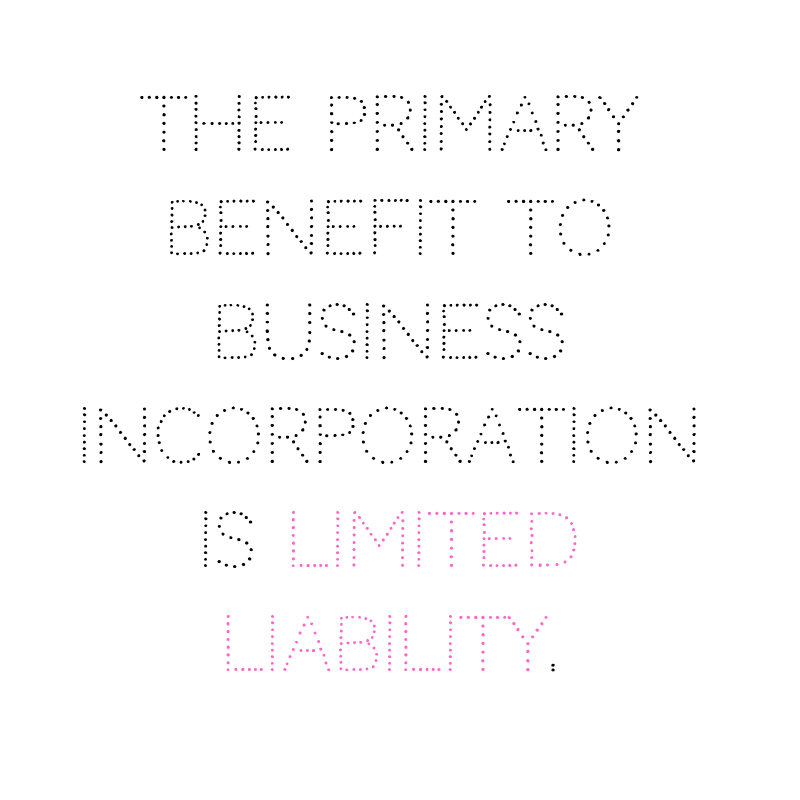Business Basics
Setting Up Your Practice - Sole Proprietor, LLC and Corporations
Okay – so we bought our Professional Liability Insurance – now what?
The next step – choose the business structure of your nutrition practice.
Choosing a business structure for your nutrition practice is necessary to protect your assets, to determine how and when you file your taxes, what (if any) business licenses you need, and what items you can deduct as business expenses. In addition, the type of business structure you choose determines how much paperwork is involved as well as how much the process will cost you.
Therefore, we are going to look at the three different business structures most private practice dietitians choose to operate as. We will examine the sole proprietor, an LLC, and an S Corporation.

Relax! The Reimbursement Dietitian is going to help you choose the best business structure for your nutrition practice.
However, please note that your business structure is not a static entity. And in fact, will likely change as your business grows! Many businesses begin as sole proprietorships and graduate to more complex business forms as the business develops. My business is a good example of the dynamic nature of business entities. I started off as a sole proprietor and now operate as an S Corporation.
In full honesty though, I wish I started off initially as an LLC instead of a sole proprietor. It created a boatload of issues I could have avoided had I properly set myself up.
What does it mean to incorporate?
First things first. Let’s get some of the technical jargon out of the way. There are two types of business entities you will be choosing from: incorporated and unincorporated.
An incorporated business means it is a company formally recognized by your state of incorporation. When a company decides to incorporate, it becomes its own legal business structure independent from the individuals who actually founded the business.
Through incorporation, the company’s owner (or owners) creates a separate legal entity to conduct business.
Sole proprietorships are an unincorporated business structure. While LLCs and S Corporations are incorporated business entities.
Why is incorporating a business important?
The primary benefit of business incorporation is limited liability. When you own a small business, like a private practice, you will likely invest significant money into not only getting it set up. But also keeping it running smoothly. As the owner, you are responsible for any debts and losses your business may accumulate along the way.
However, when you incorporate, you are typically only held responsible for the amount of money you personally invest. Your personal assets typically cannot be used to satisfy the debts and liabilities of your business. Therefore, it is critical you select the correct business structure for your nutrition practice.
Sole Proprietor
The sole proprietorship is the simplest business form under which one can operate a business. However, the sole proprietorship is not a legal entity. It simply refers to a person who owns the business and is personally responsible for its debts.
When I originally started my nutrition private practice I operated as a sole proprietor. I wish I had taken the time to set myself as an LLC right out of the gates. It created a large number of issues with my taxes as well as many unnecessary issues with the insurance companies I was credentialed with.
Therefore, while it is much easier to start off as a sole proprietor (for the reasons discussed below) I strongly encourage against it. I think it’s best practice to take the time to get set up properly as an LLC and do things right out of the gate. Yes, it will cost you some money. And I know you want to get started ASAP. But in business, it is often more important to SLOW down to SPEED up. Doing things right the first time will make your life so much easier. Trust me on this one.
A sole proprietorship can operate in two formats. It can either assume the name of its owner. Or it can do business under a fictitious name, such as The Reimbursement Dietitian. The fictitious name is simply what we refer to as a trade name (a.k.a. DBA – Doing Business As). The trade name does not create a legal entity separate from the sole proprietor owner. It does, however, allow the owner to use a name other than their own.
It is no surprise due to its simplicity, ease of setup, and low startup cost (close to zero) sole proprietorship is such a popular business format.
Now let’s dive into the pros and cons of the sole proprietor business structure.
What makes the sole proprietor so unique and favorable as a business type?
- It’s super easy to form, with no requirement to register with a state
- It’s easiest to operate, with no regulations about having a board of directors, meeting minutes, or annual meetings.
- The owner is in complete control of the business, not having to answer to anyone. There are no ifs, ands or buts about it – you are the boss!
- Owners may freely mix business and personal assets. This is referred to as co-mingling of expenses.
- The owner gets all of the profits of the business, but of course, he or she must also take all of the losses. Baller. Baller. Shot caller.
So, you must be thinking, “Wow – this structure sounds awesome! But are there any drawbacks?” Unfortunately, my friend there is.
What are the disadvantages of being a sole proprietor?
The biggest disadvantage of the sole proprietorship is that your personal legal and financial situation and the business financial and legal situation are one and the same. Unlike a corporation or an LLC, your business doesn’t exist as a separate legal entity.
This means if your practice filed for bankruptcy (which fingers crossed NEVER happens) this would affect your personal finances. It also means any lawsuits against the business can affect you as an individual, as well as your family. So, essentially there is no delineation between your personal and business assets.
You are the boss
Also, this will not come as a surprise – but all of the responsibilities and business decisions fall on the shoulders of the sole proprietor. Hence, why YOU are the BOSS. You don’t need to register your business with your state, but you will need to take care of some other legal matters.

YOU are the BOSS!
Whether or not you need a license to practice nutrition is dictated by your state.
Limited Liability Company (LLC)
LLC stands for a “limited liability company.” An LLC is a formal legal entity. Therefore, where the liability lands is a key distinguishing factor among business structures. If you are a sole proprietor the owner is 100 % responsible for the debts and liabilities of the business. In an LLC it’s the LLC that’s responsible for the business’s debts and liabilities. This means, in most cases, LLC members are protected from the creditors of the LLC and also from any lawsuits which may arise against the LLC.
Other than the fees for obtaining any required licenses or permits, setting up a sole proprietorship generally doesn’t entail very many other costs. However, unlike a sole proprietor, an LLC will need to register with its state and pay initial registration or filing fees. In addition, there are a handful of other fees, such as annual fees.
I like the saying, “Forming an LLC is like having your cake and eating it too.” You get liability protection with very limited formalities. There are no bylaws or minutes; the only document you’re required to have is the operating agreement, which is signed off by each member of the LLC and kept at the principal place of business. The only other formal document you need is an annual report, which has to be filed on a yearly basis with the state if the state requires it.
Advantages of being an LLC
Therefore, because of its unique structure, an LLC offers several advantages over other business types including:
- You guessed it! Limited liability. You’re relatively shielded from personal liability with respect to the affairs of the business
- Flexible taxation elections (you can elect to be taxed as a sole proprietorship, partnership, or corporation).
- Much less paperwork and record-keeping than in a corporation but more than a sole prop
Disadvantages of an LLC Compared to a Sole Proprietorship
The disadvantages below are fairly self-evident. More money. More paperwork.
- Set Up Cost
It costs more to start an LLC and run it than a sole proprietorship. For example, there are the initial formation fees, filing fees and annual state fees. These costs can however be partially offset by lower insurance costs. - Formal Legal Organization
Although an LLC requires fewer formalities than a corporation, there is still more paperwork involved than a sole proprietorship. A sole proprietorship can open and operate without any formal organizing procedures – not even a handwritten agreement. - Separate Records
In order to maintain the separate form of the LLC and maintain the liability protection of its members, LLC owners must carefully maintain separate records. This means keeping personal affairs entirely separate from the LLC’s business. Even more importantly, the LLC’s money should never be commingled with their personal assets. The IRS sees this as a big no-no – and rightfully so!
Like what you learned? Feel like the benefits out way the cons of becoming an LLC?
Here are the steps to form an LLC:
- Choose an available business name that complies with your state’s LLC rules.
- File formal paperwork, usually called articles of organization. Pay the filing fee (ranging from about $100 to $1000, depending on your state’s rules).
- Create an LLC operating agreement, which sets out the rights and responsibilities of the LLC members.
- Publish a notice of your intent to form an LLC (required in only a few states).
- Obtain licenses and permits that may be required for your business.
Is your head spinning right now? Breath. Don’t freak out! Figuring out the business structure of your nutrition practice is likely totally new to you! We were not taught any of this in school. I know this may seem like a lot of stuff to do – but it is not. The terms seem more technical than anything!
I love this guide published by Nola entitled “50 State Guide to Forming an LLC.” Here are the step-step directions for Connecticut. I would recommend clicking on your state to see the specific requirements involved in establishing an LLC
S Corporations
Moving right along! Hang in there. We are almost done. Time to chat about S Corporations.
Now is about the time you might start to feel a little uneasy. Some of the terms I will be using may not seem super-duper foreign. And quite frankly they are. However, I will my best to clearly outlined undefined terms and keep things as simple as possible.
S Corporations, like LLCs, are distinct legal entities. Also like an LLC, S Corporations enable business owners to separate themselves, legally and financially, from the business itself. This provides a strong level of protection for owners from creditors and lawsuits seeking financial compensation from the company.
See the common theme? Incorporated companies (LLCs & S Corps) provide legal protection against you and your assets.
However, unlike LLCs, S Corporations require a substantial level of compliance. These are often referred to as corporate formalities. These procedures are necessary to establish a clear line between the corporation and its shareholders. For this reason, small business owners often choose a simpler business organization forms like an LLC.
Now let’s look at some of the specific advantages of forming a S Corporation as your business structure of choice.
Advantages of S Corporations:
- Limited liability for all shareholders
- Distinct, court-recognized existence, which helps protect you from personal liability that can cause you to lose your personal wealth
- Flow-through taxation: Profits are distributed to the shareholders, who are taxed on profits at their personal level. Therefore, there is no double-taxation like in a regular corporation
- Optimal income-splitting potential for shareholders. You can take a smaller salary throughout the year provided you pay income taxes and regular payroll deductions. Then take the remainder of profit as a distribution subject to income tax only. Kinda like a bonus!
S Corporations are great for businesses that:
- Will provide a service (i.e. like dietitians!)
- Will not have significant start-up costs
- Will not need to make major equipment purchases before beginning operations
- Will make a sizable amount of money without a great deal of effort and expense.
As small business owners, like with anything we need to take the good with the bad. S Corporations are no different. Below are the hurdles I foresee with establishing yourself as a S Corporation.
Disadvantages of S Corporations:
- The corporation must meet strict requirements on the number and type of shareholders and types of shares.
- These requirements are imposed by federal tax law and not state corporation law.
- These rules include:
- Only individuals, certain estates and trusts, and certain tax-exempt organizations can be shareholders
- There cannot be more than 100 shareholders (although some family members can be counted as a single shareholder)
- There can only be one class of stock (although differences in voting rights are permitted)
In love with the idea of being incorporated as an S Corporation? Here are guidelines on how to get properly set up.
Key Steps to Form an S Corporation:
- Choose a legal name and reserve it
- Draft and file your Articles of Incorporation with your Secretary of State.
- Issue stock certificates to the initial shareholders.
- File Form SS-4 or apply online at the Internal Revenue Service website to obtain an Employer Identification Number (EIN).
- Apply for any other ID numbers required by state and local government agencies. Requirements vary from one jurisdiction to another, but generally, your business most likely will be required to pay unemployment, disability, and other payroll taxes – you will need tax ID numbers for those accounts in addition to your EIN.
- File the IRS form 2553 within 75 days of your corporation formation.
Conclusion
Okay, you made it. I know that was A LOT of information to digest. But I promise it is not as hard as it seems. In closing, below are the important things to consider when choosing your business structure for your nutrition practice:
- What’s your tolerance for risk to personal assets?
- How do you want the IRS to tax your business profits?
- How formal do you want your management structure to be?
- How much administrative complexity can you handle?
- What are your long-term goals for the business?
As I mentioned, I started off as a sole proprietor and gradually moved my way into an S-Corporation business structure. However, I operated for MANY years as a sole proprietor. I think in all honesty, I did this because it was easy and I did not need to really do anything aside from choose a name.
In hindsight, I think personally I should have set myself immediately up as an LLC. It was foolish for me to leave my personal and business assets unprotected. I was somewhat overwhelmed by the process of getting set up as an LLC. Also, the vocabulary at the time seemed SO over my head.
However, just like anything in life – the business structure for your nutrition practice is 110 % “figureoutable”. And at the end of the day, terms like “Articles of Organization” while may seem new to us; are nonetheless easily definable. So, don’t let the vocabulary get in the way of choosing the best business structure for the particular needs of your nutrition private practice.
And like I always say as an entrepreneur it is okay (and expected!) to ask for help. Choosing a business structure is an important issue that unless you feel fully comfortable with executing should be discussed with an accountant, an attorney, or a business advisor.
I highly recommend meeting with an accountant who can help you determine the best business structure for you. Please don’t skip this step.

